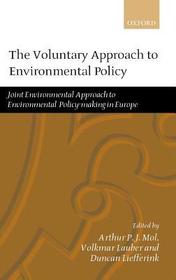
The Voluntary Approach to Environmental Policy
Joint Environmental Approach to Environmental Policy-making in Europe
- Publisher's listprice GBP 79.00
-
37 742 Ft (35 945 Ft + 5% VAT)
The price is estimated because at the time of ordering we do not know what conversion rates will apply to HUF / product currency when the book arrives. In case HUF is weaker, the price increases slightly, in case HUF is stronger, the price goes lower slightly.
- Discount 10% (cc. 3 774 Ft off)
- Discounted price 33 968 Ft (32 351 Ft + 5% VAT)
Subcribe now and take benefit of a favourable price.
Subscribe
37 742 Ft

Availability
printed on demand
Why don't you give exact delivery time?
Delivery time is estimated on our previous experiences. We give estimations only, because we order from outside Hungary, and the delivery time mainly depends on how quickly the publisher supplies the book. Faster or slower deliveries both happen, but we do our best to supply as quickly as possible.
Product details:
- Publisher OUP Oxford
- Date of Publication 5 October 2000
- ISBN 9780199241163
- Binding Hardback
- No. of pages278 pages
- Size 241x163x21 mm
- Weight 544 g
- Language English
- Illustrations line illustrations, tables 0
Categories
Short description:
Voluntary agreements in environmental policy-making are the subject of a fierce debate. Some claim it to be the panacea for failing environmental policy-making. Others see voluntary approaches as deregulation and as a further breakdown of the environmental state. This volume evaluates the practice of voluntary agreements in European countries, focusing on Austria, Denmark, and the Netherlands. It shows that both the design and the success of voluntary agreements strongly depend on specific circumstances, notably the national policy culture or style, the structure of the economic sectors involved, and the influence of the EU.
MoreLong description:
Voluntary agreements and other approaches based on co-operation between public authorities and (agro) industrial polluters are rapidly gaining importance throughout Europe. This so-called Joint Environmental Policy-making (JEP) is increasingly being presented as a 'third way', alongside direct regulation through laws and the use of financial sticks and carrots in the form of eco-taxes and subsidies. Successes and failures are reported from JEP experiences in various European countries.
This book seeks to evaluate these experiences. Is JEP really the panacea it is sometimes claimed to be? To what extent does JEP actually fit into different national policy systems and cultures? Is the application of JEP dependant on specific circumstances? In answering these and other questions, the book focuses on the forces and institutional conditions that are likely to promote the introduction, determine the form, and contribute to the successful functioning of JEP arrangements. Against the background of both deregulation and ecological modernization tendencies in European environmental policy, this book offers detailed analysis of JEP in three European countries (Austria, Denmark, and the Netherlands) and in three areas: industrial energy efficiency, food labelling, and package waste.
The volume contributes to a better understanding of JEP in Europe and formulates policy recommendations for its successful implementation. But it also contributes to comparative environmental policy studies in providing an innovative approach.
This book makes a significant theoretical and practical contribution in the field of voluntary environmental policy by explaining why/how JEP [joint environmental policy-making] emerges and by discussing useful policy lessons. It also opens new opportunities for research
Table of Contents:
Introduction
Interpreting Joint Environmental Policy-making
The Political and Institutional Setting
Industrial Energy Efficiency
Packaging Waste
Labelling of Organic Food Products
A Comparative Analysis of JEP
Epilogue




